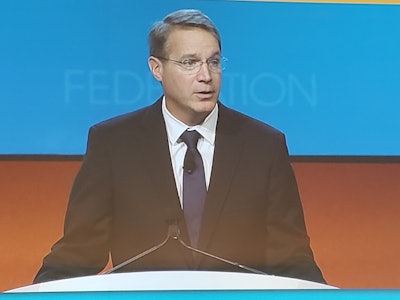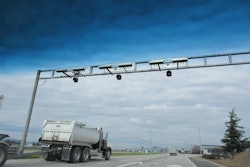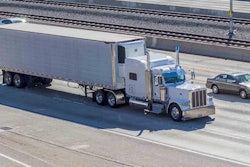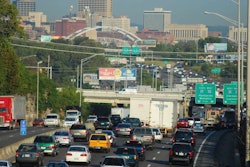 Chris Spear delivered his State of the Industry address on Monday at ATA’s 2018 Management Conference and Exhibition in Austin, Texas.
Chris Spear delivered his State of the Industry address on Monday at ATA’s 2018 Management Conference and Exhibition in Austin, Texas.Chris Spear, head of the American Trucking Associations, on Monday fleshed out the legislative and regulatory agenda items the group intends to pursue in the coming years. Hours of service reforms, exempting carriers from California’s meal and rest break laws and lobbying Congress for a fuel tax increase to fund highway infrastructure are chief among ATA’s priorities, says Spear, who gave his annual State of the Industry address Monday morning at ATA’s 2018 Management Conference & Exhibition in Austin, Texas.
ATA also intends to challenge states that enact trucks-only tolls, he says, and to press Congress to open interstate driving up to CDL holders under the age of 21, who are currently restricted to intrastate operations.
Spear took an aggressive stance on the issues, equating them to engaging in “trench warfare” and playing “a full contact sport.” Here’s what he said on each of the topics:
Hours of service: Spear said with ELD use now nearly universal and logging data readily available from the devices, “now’s the time for FMCSA to make sensible changes to the federal hours of service regulations,” he said.
Spear didn’t specify what reforms ATA would like to see. But flexibility is needed within existing hours of service regs, he said. “ELDs make more data available to the industry than ever before, enabling ATA to advocate for common-sense improvements to these rules and allowing us to tighten the reins on detention time.”
FMCSA just concluded a 45-day comment period regarding hours of service reforms. They agency sought comments on the 14-hour rule, 30-minute break rule and split-sleeper berth flexibility, among other areas of hours of service.
Meal and rest break laws: Spear said that ATA has “exhausted every legislative option” over the past four years in its quest to see carriers exempted from California labor laws that require employers to provide meal breaks paid rest breaks to workers. In 2014, the U.S. Ninth Circuit Court of Appeals ruled in a case involving Penske Logistics and its drivers that carriers operating in the state must provide the breaks to drivers.
ATA has argued that federal laws supersede state-level laws and has lobbied Congress to act on the issue. However, Congress has failed to pass legislation containing the meal and rest break provision, so ATA has turned its sights to the U.S. DOT. The group filed a petition last month asking the DOT to intercede and declare carriers exempt from the California laws.
“Over the past four years we’ve fought this California-born battle on Capitol Hill, with what could be best described as trench warfare,” he said. “Approval of ATA’s petition will put safety first, preserve interstate commerce and deliver justice on behalf of our industry,” said Spear. “I am confident that justice will prevail soon.”
Infrastructure and tolling: Spear said the group intends to press for action on its Build America Fund plan, which calls for nickel-a-year increases to the per-mile gas and diesel tax for four years. It would push such taxes to 20 cents higher per gallon in sum. Spear said the plan provides “real money” for infrastructure funding and would shore up the Highway Trust Fund, which is on the verge of insolvency. The federal gas and diesel tax, which funds the Highway Trust Fund, hasn’t been raised since 1993.
More fuel efficient vehicles and inflation of severely undercut the tax’s ability to fund the Highway Trust Fund. ATA has been an advocate of raising the gas and diesel tax for years. Spear called their plan “the most conservative and immediate way to fund and fix our nation’s ailing roads and bridges.”
Spear said ATA’s plan has been endorsed by the U.S. Chamber of Commerce.
He also said the group intends to fight in court against state-level efforts to initiate trucks-only toll plans, such as those in place in Rhode Island and Indiana. “ATA has an obligation to flank our state association executives and protect the federation from flawed and potentially contagious tolling policies that could eventually have national implications.”
Under-21 interstate drivers: Allowing CDL holders under the age of 21 to drive in interstate operations would allow fleets to “[recruit] our future workforce at the earliest age possible,” said Spear. “Beyond all the social goodwill that comes from engaging our nation’s youth, the truth of the matter is we need them,” he said, referring to the industry’s need for new drivers.
ATA-backed legislation in Congress, the Drive-Safe Act, would allow under-21 CDL holders to cross state lines after they have 400 hours of on-duty training, 240 of which would include drive time with an experienced driver in cab. It also calls for trucks in this program to be equipped with safety systems like active braking technology, speed limiters and video recorders.
Spear asked why an 18-year-old could be sent overseas to “fight our wars,” but “not be allowed to drive across state lines in a truck?”











